| 13 July |
• yesterday • tomorrow |
| Optional Memorial of Saint Henry, Holy Roman Emperor |
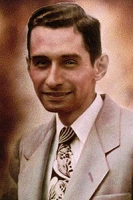
4 May (Puerto Rico, based on the day of his baptism)
Second of five children born to Manuel Baudilio Rodriguez and Herminia Santiago; theirs was a pious family as one of his sisters is a Carmelite nun, one brother a Benedictine monk, the first Puerto Rican to be an abbot. When Carlos was six years old, the family store and home were burned to the ground, and the Rodriguezes moved in with his mother's family. Carlos spent time with his pious maternal grandmother Alexjandrina Esteras who was a significant influence on him. At age 9, Carlos wrestled a rabid dog that had snatched up his 1-year-old cousin; Carlos was badly wounded in the fight, but his cousin survived to live a long life. Carlos suffered from ulcerative colitis from age 13, which interrupted a brilliant scholarly career; he completed high school, but it was several years before he could move on to college.
Carlos never passed up a chance to serve as an altar boy. He worked as an office clerk until 1946, and tried to attend the University of Puerto Rico, but his health prevented it. After receiving a few lessons, he taught himself to play piano and organ, and loved to spend days hiking in the countryside.
Worked as an office clerk at Caguas, Puerto Rico, and at the University of Puerto Rico Agriculture Experiment Station. Part of his works was as a translator, converting English documents to Spanish. He then used his translating skills to write, and with his modest salary to publish, the magazines Liturgy and Christian Culture. With the help of Father McWilliams, he founded a Liturgy Circle at Caguas. With Father McGlone, he organized the chorus Te Deum Laudamus.
Carlos's principal apostolic work was at Catholic University Center, Rio Piedras, Puerto Rico where he evangelized to students and teachers. He organized another Liturgy Circle (Circulo de Cultura Christiana: Christian Culture Circle), and published Christian Life Days to help university students enjoy the liturgical seasons. A member of the Brotherhood of Christian Doctrine, Holy Name Society, and Knights of Columbus, he taught catechism to high school students, encouraged liturgical renewal among clergy and laity, and worked for active participation of the laity, the use of vernacular language, and devotion to the Paschal Vigil – all prior to Vatican II.
As the years went by, his health declined further. He suffered from rectal cancer, and the misery of aggressive surgery in 1963. At one point in this misery he felt himself abandoned by God, but soon rediscovered his faith and enthusiasm, and was an example to all of joy in the midst of suffering.
22 November 1918 at Caguas, Puerto Rico
13 July 1963 of cancer at Caguas, Puerto Rico
• 29 April 2001 by Pope John Paul II
• the miraculous cure of a patient's non-Hodgkins malignant lymphoma in 1981 is attributed to him
• his Cause is unique, being carried forward by the laity
• first Puerto Rican blessed
• first Caribbean layman blessed
We need Catholics who are alert to the present moment...modern Catholics who know how to nourish themselves in the past but whose eyes are fixed on the future. - Blessed Carlos
https://catholicsaints.info/blessed-carlos-manuel-cecilio-rodriguez-santiago/
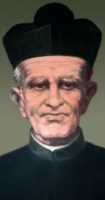
Padre Marianito
Eldest son of a religious rural Colombian family in a time when the state was hostile to the Church. From age 16 he wanted to become a priest; he entered the new Medellin Seminary at age 24, and was ordained in 1872. Worked in the parishes of San Pedro and Yarumel, and in 1878 he was assigned as priest to Angostura, Colombia where he spent the rest of his life.
Mariano had a great love for the poor, especially rural labourers. His preaching was simple and effective, his time spent ministering to the spiritual and social needs of his flock, and the people who knew him considered him a saint in life. However, his parish was in an area beset by civil war, and neither side seemed sympathetic to the Church; several times Mariano had to hide in nearby caves to escape the fighting.
Padre Marianito was beatified after confirmation of a miracle in the life of Father Rafael Gildardo Velez Saldarriaga of Medellin. Velez underwent prostate surgery in 1970; in 1982 he developed cancer on the scar. He had surgery, cobalt and estrogen therapies, and seemed to have recovered. In March 1987 he developed an oedema of the legs that turned into elephantiasis followed by metastasis of the spinal column, and the 75 year old priest was pronounced terminal. But in September 1987 he began to improve. In two months the oedema was reduced, the cellulitis and bone metastasis had disappeared. Doctors and scientists examined Father Velez in June 1991, and declared his cure had no scientific explanation. Additional analyses carried out in 1997 showed complete recovery, and on 4 April 1998, the Medical Commission of the Vatican Congregation for the Causes of Saints acknowledged unanimously that the priest's cure could not be scientifically explained, and was attributed to Padre Marianito's intercession.
14 October 1845 at Yarumal, diocese of Antioquía, Colombia
13 July 1926 at Angostura, Antioquia, Colombia of severe urinary system infections
• 9 April 2000 by Pope John Paul II
• first Colombian to be beatified
against cancer
I have already lived long enough. Now my greatest desire is to be united to my Jesus. - Blessed Mariano on his death bed
[Father Mariano] knew how to integrate himself totally in the life of the people, sharing in the sorrows and joys of all. For all of them he was a diligent Father, teacher and trustworthy counselor, and a faithful witness of Christ's love among them. The poor, whom he called 'Christ's nobles,' were his favorites. He never hesitated to use his own goods to alleviate the penury and indigence of the weakest. He frequently visited the sick, and was available at all times of the day and night to help them. He took care of children and youth with infinite gentleness and simplicity to lead them on the road of good habits and prudence. - Vatican Information Office
https://catholicsaints.info/blessed-mariano-de-jesus-eues-hoyos/
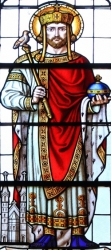
• Good King Henry
• Heinrich, Duke of Bavaria
Son of Gisella of Burgundy and Henry II the Quarrelsome, Duke of Bavaria. Educated at the cathedral school in Hildesheim by bishop Wolfgang of Regensburg. Became Duke of Bavaria himself in 995 upon his father's death, which ended Henry's thoughts of becoming a priest. Ascended to the throne of Germany in 1002. Crowned King of Pavia, Italy on 15 May 1004. Married Saint Cunegunda, but was never a father. Some sources claim the two lived celibately, but there is no evidence either way.
Henry's brother rebelled against his power, and Henry was forced to defeat him on the battlefield, but later forgave him, and the two reconciled. Henry was crowned Holy Roman Emperor in 1014 by Pope Benedict VIII; he was the last of the Saxon dynasty of emperors. Founded schools, quelled rebellions, protected the frontiers, worked to establish a stable peace in Europe, and to reform the Church while respecting its independence. Fostered missions, and established Bamberg, Germany as a center for missions to Slavic countries. Started the construction of the cathedral at Basel, Switzerland; it took nearly 400 years to complete. Both Henry and Saint Cunegunda were prayerful people, and generous to the poor.
At one point he was cured of an unnamed illness by the touch of Saint Benedict of Nursia at Monte Cassino. He became somewhat lame in his later years. Widower. Following Cunegunda's death, he considered becoming a monk, but the abbot of Saint-Vanne at Verdun, France refused his application, and told him to keep his place in the world where he could do much good for people and the advancement of God's kingdom.
6 May 972 at Albach, Hildesheim, Bavaria, Germany
13 July 1024 at Pfalz Grona, near Göttingen, Saxony (in modern Germany) of natural causes
1146 by Pope Blessed Eugene III
• against sterility
• childless people
• disabled, handicapped or physically challenged people
• dukes
• kings
• people rejected by religious orders
• diocese of Bamberg, Germany
• Basel, Switzerland
• Benedictine Oblates
https://catholicsaints.info/saint-henry-ii/
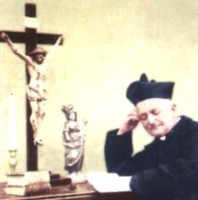
Raised in a pious family, he was educated by the Barnabites in Bologna, Italy and the Jesuits in Ferrara, Italy. Jesuit novice in Rome, Italy in 1838, but health problems force him to drop out and return home. When he improved, he studied theology in Ferrara, and was ordained in 1844.
Noted spiritual director and preacher of home missions. He taught Italian and Latin at the seminary in Finale Emilia, Italy, and studied civil and canon law at the Pontifical University of Bologna, Italy. In 1851 the Archbishop of Bologna asked him to administer a troubled parish in Galeazza, Italy. He was so successful at renewing his flock that he was appointed him the parish priest; he stayed for 41 years.
In 1867 Father Ferdinand lost his voice, and was forced to write out his lessons and have others deliver them. With his public work restricted, he concentrated on one-to-one spiritual direction, hearing confessions up to 16 hours at a time. His direction, and his personal holiness, attracted so many spiritual students that without his planning it, a religious congregation formed around the parish. The Confraternity of the Sorrowful Mother was founded to teach poor girls in the area. Later, the Servite Third Order was established. In 1862 he opened a small convent for the members, and in 1866 they were formalized under the rule of the Mantellate Servile Sisters of Rome; the community was approved by the Archbishop of Bologna in 1899, and by the Vatican in 1919. The Confraternity continues its work today in Italy, Germany, Brazil, South Korea and the Czech Republic.
14 May 1821 in Campodoso (modern Modena), Italy
13 July 1893 of natural causes
3 October 1999 by Pope John Paul II
https://catholicsaints.info/blessed-ferdinando-maria-baccilieri/
3rd Sunday of September (procession commemorates the attempted movement of her relics)
Young Christian woman in Trieste, Italy who had consecrated herself to God during a period of persecution. A pagan friend of the city's imperial consol Fabiano sought Giuliana in marriage, but she refused, and was discovered to be a Christian. She was arrested, ordered to renouce her faith, and when she would not, sentenced to death. Martyr.
• arrows fired at her would not strike her, and the archers would suddenly sweat blood
• beheaded in Trieste, Italy
• her body was transported to a planned burial site in Sicily, Italy; when the ox pulling the cart reached Arzano, Italy, it refused to go further; the people took this as a sign that the saint wished to stay there
• skull enshrined in a glass case in the church of San Martino in Torre d'Arese, Italy
• legend says that on the 3rd Sunday of September in 1670, the bishop of Pavia, Italy tried to take her relics to his city; when he reached the city limits of Arzano, a massive thunderstorm began, stopping the travellers; if they retreated back into the city, the storm would lessen; when they approached the limits again, it would get worse; when the bishop returned the relics to their original location, the storm stopped and the sun came out; a procession of her relics is still held on the 3rd Sunday in September, but they people are careful never to leave the city limits
• Arzano, Italy
• unmarried girls (in Torre d'Arese, Italy)
https://catholicsaints.info/saint-giustina-of-arzano/
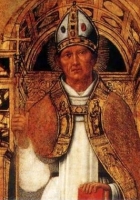
• James of Varazze
• James of Viraggio
• James of Genoa
• Giacomo, Jacob, Jacobus, Jacopo
Dominican in 1244 at age 14. Taught theology and Bible study. Prior of his house in Genoa, Italy. Provincial of Lombardy from 1267 to 1286 where he was a noted preacher. Chosen archbishop of Genoa in 1286, but refused the position. Genoa was placed under interdict for supporting a revolt against the King of Naples; Pope Nicholas IV apppointed James to raised the interdict in 1288. Again chosen archbishop of Genoa in 1292, and this time he was ordered to accept.
He tried to reconcile the warring Guelphs and Ghibellines, was generous to the poor, built and repaired churches, monasteries, and hospitals. He worked to insure clerical discipline, and is reported to have translated the Bible into Italian, though no copies have survived. Wrote the Legenda Aurea Sanctorum (The Golden Legend), a collection of scores of tales of the saints; it has become an invaluable source for information on the middle ages, and reading it led Saint Ignatius of Loyola to a conversion experience.
c.1226 at Varazze (modern Voragine), diocese of Savona, Italy (near Genoa)
13 July 1298 in Genoa, Italy of natural causes
11 May 1816 by Pope Pius VII (cultus confirmation)
https://catholicsaints.info/blessed-james-of-voragine/
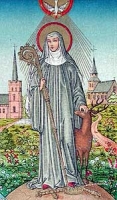
• Mildred of Minster
• Mildthryth...
• 18 May (translation of relics)
• 20 February (translation of relics)
Daughter of Merewalh, King of Mercia, and Saint Ermenburga of Thanet. Sister of Saint Milburga and Saint Mildgytha. Educated at the convent school of Chelles, near Paris, France. Rejected an offer of marriage, and entered the convent of Minster on the Isle of Thanet, a house which was founded by her mother, is still in use, and is one of the oldest continuously occupied structures in Britain. Benedictine nun. Worked with Saint Theodore of Canterbury. Abbess at Minster where one of her novices of Saint Edburga. Noted for her generosity to the poor, and special attention to social outcasts. Yearly pilgrimages to her relics at Minster continue to today.
• c.700 of natural causes
• relics first enshrined at Canterbury, England
• relics translated to Deventer, the Netherlands
• part of the relics have been translated to Minster, England
1388 by Pope Urban VI
• Benedictine nun accompanied by a hart, usually white
• Benedictine nun holding a church
• Benedictine nun with three geese
https://catholicsaints.info/saint-mildred-of-thanet/
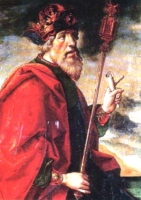
Ezra
Priest and scribe who left Babylon in the 7th year of Artaxerxes (458 B.C.) with a caravan of 1,800 Jewish exiles, to return to Jerusalem. The Persian king had given Esdras a letter ordering the satraps beyond the Euphrates to aid him to enforce observance of the Mosaic Law in Judea. Esdras brought with him an exemption from taxation for the temple officials, and gifts from Artaxerxes and the Jews of Babylon. With these the temple worship was to be enhanced and subsidized. Within a year mixed marriages, of which even priests had been guilty, were dissolved. In 444 B.C., after the walls of Jerusalem had been rebuilt, the Law was read to the assembled multitude, whereupon the Feast of Tabernacles and the Day of Atonement were observed. There followed the renewal of the Covenant, which all solemnly agreed to keep. By Esdras and Nehemias the restoration of the Law was effected. The measures which Esdras himself effected determined in great part the organization and practise of later Judaism. The Talmud assigns to him the compilation of the Books of Paralipomenon. He is also credited with the collection of the canonical books of the Old Testament extant in his time. Jewish tradition regards him as the author of the Books of Esdras.
https://catholicsaints.info/esdras-the-prophet/
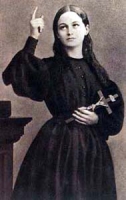
Cloelia Barbieri
From her earliest life, Clelia paid no attention to this world, focused solely on the spiritual life. Founded the Little Sisters of the Mother of Sorrows who concentrate on ministering in hospitals and elementary schools to the sick, the aged, the lonely, and a prayer ministry for the poor. Since her death, her voice has been heard in the houses of her order, accompanying her sisters in song.
13 February 1847 at Bundrie di San Giovanni, Persiceto, Italy
13 July 1870 at Bologna, Italy of tuberculosis
9 April 1989 by Pope John Paul II
• Little Sisters of the Mother of Sorrows
• people ridiculed for their piety
https://catholicsaints.info/saint-clelia-barbieri/
Berthold of Scheda
Older brother of Blessed Menrich of Lübeck. Priest. Member of the Premonstratensians. Lay brother at the Scheide monastery near Fröndenberg-on-der-Ruhr, Westphalia (in modern Germany). Hermit at Berg Haslei. There he started speaking out against immorality, standing in the shade of a large oak tree where so many would-be spiritual students gathered that he built a hermitage and chapel to minister to them; that chapel had an image of the Blessed Virgin Mary that his father had brought from the Holy Land. With Blessed Menrich, he founded the Cistercian convent of Vrundeberg Abbey in Westphalia.
12th century near Lübeck, Schleswig-Holstein (in modern Germany)
• c.1214 of natural causes
• buried at the Scheda monastery near Fröndenberg-on-der-Ruhr, Westphalia (in modern Germany)
https://catholicsaints.info/blessed-berthold-of-scheide/
• Thomas Helmes
• Thomas Dyer
29 October as one of the Martyrs of Douai
Benedictine. Studied at the seminary in Douai, France. Priest. He returned to England to minister to covert Catholics, using false names to hide from the authorities. Martyred for the crime of priesthood in the persecutions of King James I.
Norwich, Norforlk, England
hanged on 13 July 1616 in Tyburn, London, England
15 December 1929 by Pope Pius XI
https://catholicsaints.info/blessed-thomas-tunstal/
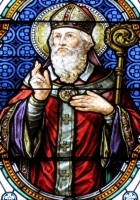
Eugenius
Bishop of Carthage, North Africa in 481. Exiled to the desert of Tripoli with many of his parishioners, some of them children, by Arian Vandals. They were allowed to return in 488, but Eugene was exiled again in 496, and he eventually settled in Albi, Italy.
505 in Albi, Italy of the mistreatment suffered in exile
https://catholicsaints.info/saint-eugene-of-carthage/
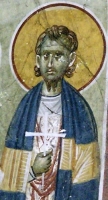
Serapione
Martyred in the persecutions of emperor Septimius Severus and governor Aquila.
burned alive c.248 in Alexandria, Egypt
https://catholicsaints.info/saint-serapion-of-alexandria-13-july/
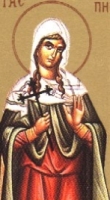
Noted for her many pilgrimages to the graves of martyrs. Hid the relics of Saint Isidore from persecutors, for which action she was imprisoned and scourged.
Chios, Greece
c.251 in prison from the effects of torture
https://catholicsaints.info/saint-myrope/
Bishop of Würzburg, Germany in 855. Helped organize Crusaders from Bohemia, Moravia and Normandy. Killed by pagan Slavs while he was celebrating Mass. Martyr.
9th century
13 July 892 at Chemnitz, Saxony (in modern Germany)
https://catholicsaints.info/saint-arno-of-wurzburg/
Thivisiau, Tuien, Turiav, Turiave, Turiavus, Turien, Turiano, Turiavo
Born to the 8th century French nobility. Monk. Abbot. Priest, ordained by Saint Sampson. Bishop of Dol, Brittany, France.
in Brittany, France
c.750 of natural causes
https://catholicsaints.info/saint-turiaf/
Mercedarian friar. Travelling through Algiers and north Africa from 1398 to 1401, he was repeatedly abused and tortured, but freed 128 Christians who had been enslaved by Muslims.
1401 of natural causes
https://catholicsaints.info/blessed-jean-of-france/
Zealous evangelist who brought many pagans to the faith. Martyred in the persecutions of Septimus Severus.
burned alive c.195, probably in Macedonia
https://catholicsaints.info/saint-serapion-of-macedonia/
Exiled from Carthage, North Africa to the desert of Tripoli by Arian Vandals. Martyr.
505
https://catholicsaints.info/saint-salutaris-of-carthage/
Exiled from Carthage, North Africa to the desert of Tripoli by Arian Vandals. Martyr.
505
https://catholicsaints.info/saint-muritta-of-carthage/
Doewan
Son of the chieftain Saint Brychan of Brycheiniog. Martyr.
5th century in Dyfed, Wales
https://catholicsaints.info/saint-dogfan/
Fifth-century desert hermitess in Egypt known for her piety, discipline and extremely ascetic life.
https://catholicsaints.info/saint-sarra-of-egypt/
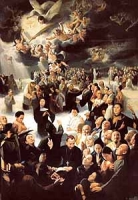
Baolu, Paul
28 September as one of the Martyrs of China
Married layman in the apostolic vicariate of Southeastern Zhili, China. During the persecutions of the Boxer Rebellion, all the other members of his village renounced Christianity to save their lives. Paulus, instead, went out to meet the Boxers with a rosary and prayer book. Martyr.
c.1821 in Lanziqiao, Hengshui, Hebei, China
13 July 1900 in Lanziqiao, Hengshui, Hebei, China
1 October 2000 by Pope John Paul II
https://catholicsaints.info/saint-paulus-liu-jinde/

• Joseph Wang Guiji
• Ruose
28 September as one of the Martyrs of China
Layman in the apostolic vicariate of Southeastern Zhili, China. Martyred in the Boxer Rebellion.
c.1863 in Nangong, Jizhou, Hebei, China
13 July 1900 in Nangong, Jizhou, Hebei, China
1 October 2000 by Pope John Paul II
https://catholicsaints.info/saint-iosephus-wang-kuiju/
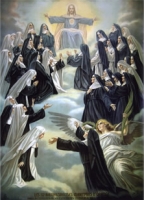
Marie of the Annunciation
9 July as one of the Martyrs of Orange
Sacramentine nun. Martyred in the French Revolution.
13 February 1770 in Sérignan, Vaucluse, France
guillotined on 13 July 1794 in Orange, Vaucluse, France
10 May 1925 by Pope Pius XI
https://catholicsaints.info/blessed-therese-henriette-faurie/

Madeleine of the Mother of God
9 July as one of the Martyrs of Orange
Sacramentine nun. Martyred in the French Revolution.
2 January 1769 in Bollène, Vaucluse, France
guillotined on 13 July 1794 in Orange, Vaucluse, France
10 May 1925 by Pope Pius XI
https://catholicsaints.info/blessed-elisabeth-verchiere/

Sister Saint Gervase
9 July as one of the Martyrs of Orange
Ursuline nun. Martyred in the French Revolution.
5 October 1749 in Bollène, Vaucluse, France
guillotined on 13 July 1794 in Orange, Vaucluse, France
10 May 1925 by Pope Pius XI
https://catholicsaints.info/blessed-marie-anastasie-de-roquard/

Sister Saint Alexis
9 July as one of the Martyrs of Orange
Sacramentine nun. Martyred in the French Revolution.
4 February 1740 in Sérignan, Vaucluse, France
guillotined on 13 July 1794 in Orange, Vaucluse, France
10 May 1925 by Pope Pius XI
https://catholicsaints.info/blessed-anne-andree-minutte/

Sister Saint Francis
9 July as one of the Martyrs of Orange
Ursuline nun. Martyred in the French Revolution.
17 August 1742 in Pierrelatte, Drôme, France
guillotined on 13 July 1794 in Orange, Vaucluse, France
10 May 1925 by Pope Pius XI
https://catholicsaints.info/blessed-marie-anne-lambert/

Saint Saint Frances
9 July as one of the Martyrs of Orange
Ursuline nun. Martyred in the French Revolution.
2 October 1756 in Tulette, Drôme, France
guillotined on 13 July 1794 in Orange, Vaucluse, France
10 May 1925 by Pope Pius XI
https://catholicsaints.info/blessed-marie-anne-depeyre/
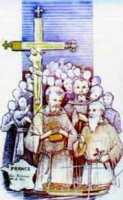
Priest of the diocese of Limoges, France. Imprisoned on a ship in the harbor of Rochefort, France and left to die during the anti-Catholic persecutions of the French Revolution. One of the Martyrs of the Hulks of Rochefort.
18 March 1753 in Moutier, Haute-Vienne, France
13 July 1794 aboard the prison ship Deux-Associés, in Rochefort, Charente-Maritime, France
1 October 1995 by Pope John Paul II
https://catholicsaints.info/blessed-barthelemy-jarrige-de-la-morelie-de-biars/

Franciscan Capuchin priest. Imprisoned on a ship in the harbor of Rochefort, France and left to die during the anti-Catholic persecutions of the French Revolution. One of the Martyrs of the Hulks of Rochefort.
19 December 1741 in Rouen, Seine-Maritime, France
13 July 1794 aboard the prison ship Deux-Associés, in Rochefort, Charente-Maritime, France
1 October 1995 by Pope John Paul II
https://catholicsaints.info/blessed-louis-armand-joseph-adam/
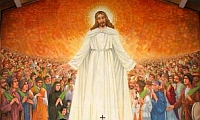
Emmanuel Le Van Phung
24 November as one of the Martyrs of Vietnam
Married layman in the apostolic vicariate of West Cochinchina (in modern Vietnam). Father and catechist; he built a church, a convent for the Daughters of Mary, a home for missionaries, and a college. Arrested on 7 January 1859 in the persecutions of emperor Tu-Duc for the crime of harboring a priest. While in prison, Emmanuele continued to urge his family to cling to their faith and show charity to the persecutors. Martyr.
c.1796 in Ðau Nuoc, Cù Lao Giêng, Vietnam
• beheaded on 13 July 1859 in Châu Ðoc, An Giang, Vietnam
• buried in Ðau Nuoc, Cù Lao Giêng, Vietnam
19 June 1988 by Pope John Paul II
https://catholicsaints.info/saint-emanuele-le-van-phung/
300 Christians who retired to Cyprus to live as cave hermits, devoting themselves to prayer and an ascetic life devoted to God. Tortured and martyred for their faith, and their bodies dumped in the various caves in which they had lived. We know the names of five of them, but no other details even about them – Ammon, Choulélaios, Epaphroditus, Eusthénios and Héliophotos.
• beheaded in the 12th century on Cyprus
• body dumped in the cave where he had lived, and only rediscovered long afterwards
https://catholicsaints.info/martyrs-of-cyprus/
31 soldiers martyred for their faith in the persecutions of prefect Magno, date unknown. The only name that has come down to us is Alexander.
Philomelio, Phrygia (in modern Turkey)
https://catholicsaints.info/martyrs-of-philomelio/
• Our Lady of Grace of Valsorda
• Our Lady of Soccorso
• Martyrs of Alexandria
• Britta of Balagny
• Cruimther Fionntain of Cill-Airthir
• Ernin of Inis-Caoin
• Ernst of Neresheim
• Fintan of Killerr
• Francesco da Casale
• Golindouch
• Maura of Balagny
• Silas
• Siree of Kurdistan
• Stephen the Hymnographer
CatholicSaints.Info Portable Edition